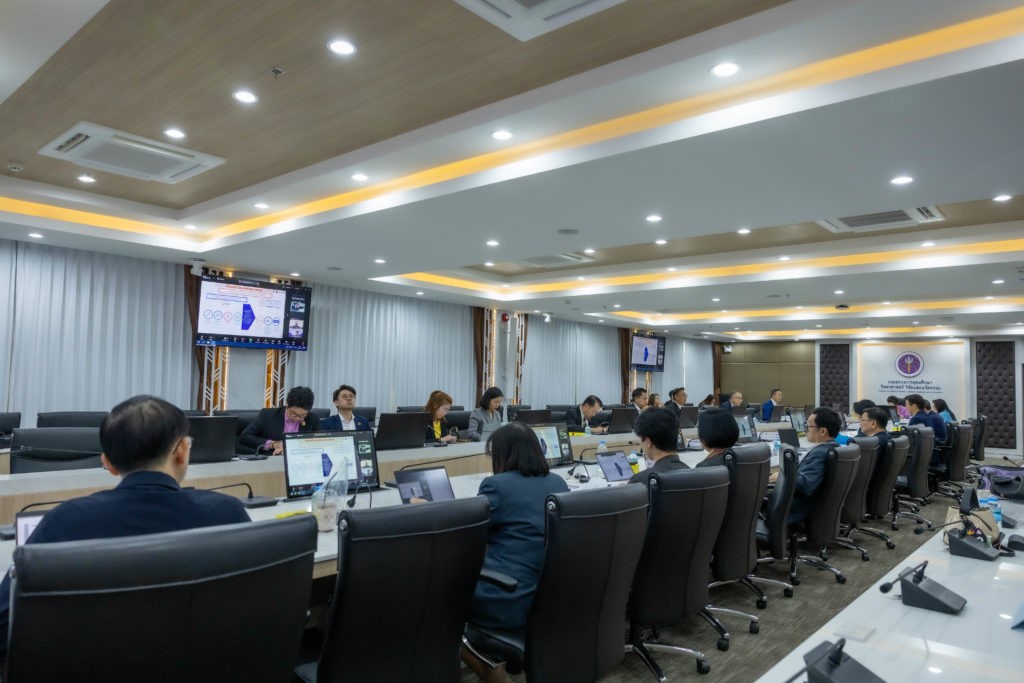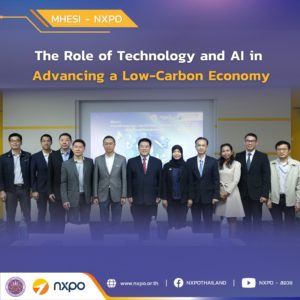On 20 December 2024, MHESI-NXPO convened the Executive Board Meeting, chaired by Ms. Supamas Isarabhakdi, Minister of Higher Education, Science, Research and Innovation (MHESI). Key agenda items included the appointment of six experts to serve on the NXPO Executive Board and presentations of the 2024 performance reports from NXPO and the Program Management Units (PMUs).

NXPO President Dr. Surachai Sathitkunarat announced the appointment of the following six experts to the Executive Board: 1) Prof. Wuttisarn Tanchai, 2) Prof. Chutima Eamchotchawalit, 3) Assoc. Prof. Dr. Soranit Siltharm, M.D., 4) Mr. Narit Therdsteerasukdi, 5) Mr. Chana Poomee, and 6) Mr. Theerawat Limpibunterng. The appointments are effective from 18 October 2024 for a four-year term.
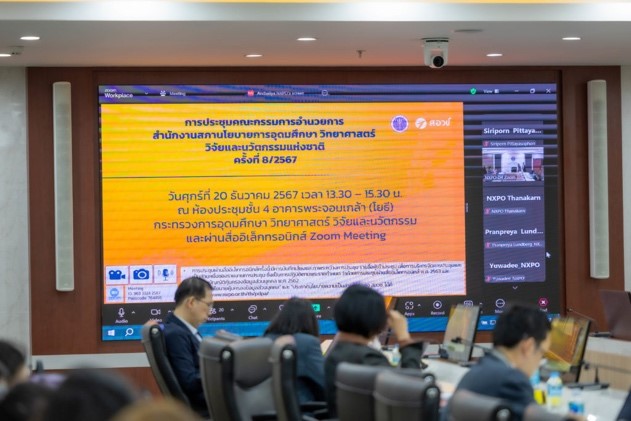
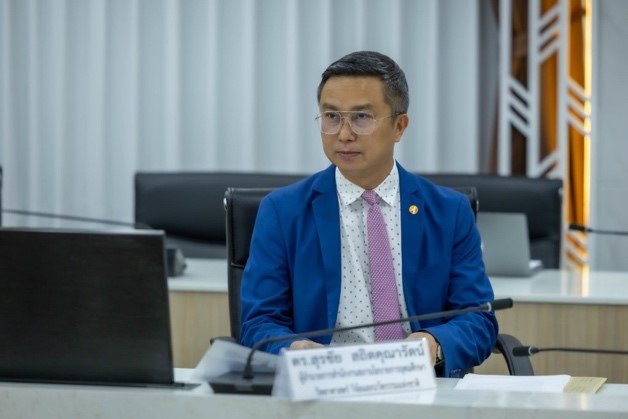
Dr. Surachai presented the 2024 performance report of NXPO, highlighting its efforts to design policies and mechanisms in higher education, science, research, and innovation to bring Thailand out of the middle-income trap and enhance its global competitiveness. The key targets are fostering 1000 innovation-driven enterprises (IDEs) with 1 billion-THB revenue, reducing inequality for 1 million individuals, contributing to 10 million tons of carbon reduction, and raising the proportion of highly skilled labor to 25%.
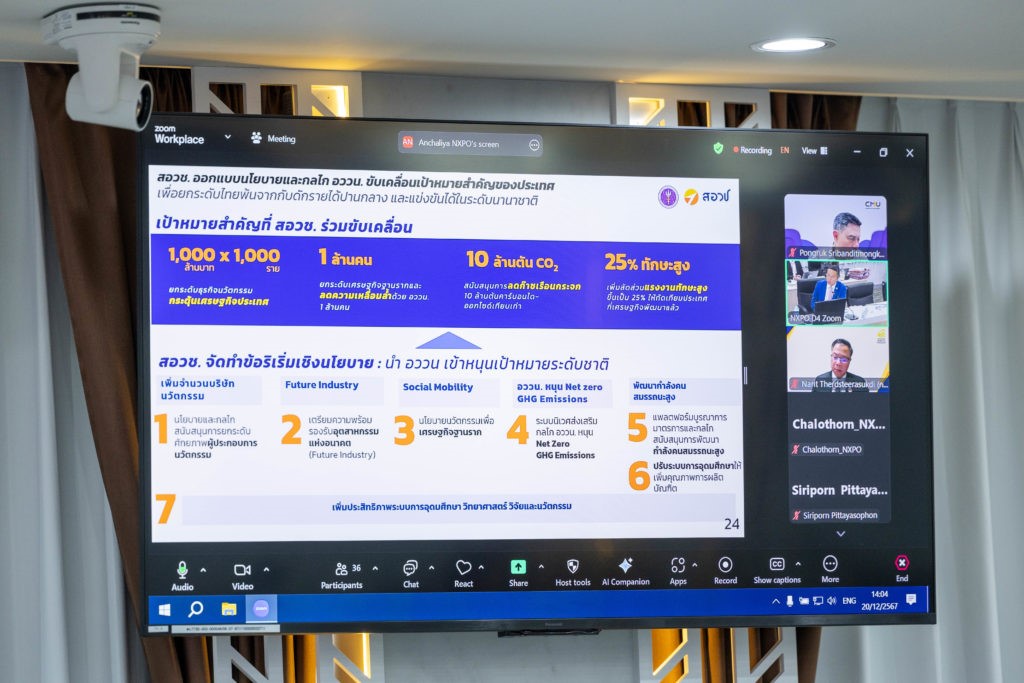
Achievements under NXPO’s key initiatives included:
- Enabling Thailand to escape the middle-income trap: Establishing a platform to enhance enterprise capabilities, enabling them to expand market access domestically and internationally.
- Preparing for future industries: Accelerating market entry for the future food sector to add 500 billion THB to the economy by 2027, cultivating an innovation ecosystem and workforce development program to support a 50-billion-THB investment in the semiconductor sector, and advancing EV-Conversion standards to enable commercial production and position Thailand as a global EV hub.
- Fostering the grassroots economy: Developing and integrating highland research agenda into the Science, Research, and Innovation Plan, creating a Social Enterprise Incubation Platform to nurture local and social entrepreneurs in collaboration with regional science parks, and establishing mechanisms to reduce youth dropout rates.
- Contributing to 10 million tons of greenhouse gas: Piloting a net-zero ecosystem and launching a platform supporting 50 universities in achieving net-zero targets.
- Raising the proportion of highly skilled labor to 25%: Developing a high-skilled workforce development platform to support academia-industry HRD collaboration and Thailand Plus Package which has resulted in the certification of 10,189 STEM employments in 186 companies and 1,157 STEM-related courses and conducting a survey to assess research and innovation workforce needs in industries for 2025–2029.
- Facilitating university transformation: Supporting the launch of 16 new programs under the Higher Education Sandbox mechanism, aiming to produce 26,045 skilled workers.
- Enhancing the higher education, science, research and innovation system: Introducing a new budget allocation system tailored to the research missions and objectives of each ministry and streamlining data collection for a unified higher education, science, research and innovation database.
Dr. Surachai also outlined key policy initiatives aimed at leveraging higher education, science, research, and innovation in support of national goals, including: 1) Enhancing the capabilities of IDEs, 2) Preparing for future industries, 3) Promoting the grassroots economy, 4) Establishing an ecosystem to achieve net-zero emissions, 5) Developing an integrated platform supporting high-skilled workforce development, and 6) Reforming the higher education system.
The three PMUs – the Program Management Unit on Area Based Development (PMU A), the Program Management Unit for Human Resources & Institutional Development, Research and Innovation (PMU-B), and the Program Management Unit for Competitiveness (PMUC) – also presented their 2024 performance reports. Highlights included administering 965.35 million-THB research funding to 46 organizations by PMU-B, and key programs such as the global partnership for lifelong learning and networks supporting research and human resource development in advanced technologies.
PMU A presented the Provincial Poverty Alleviation Platform (PPAP) aimed at employing technologies and innovations tailored to the provincial context to alleviate poverty, and the Local Enterprise Platform to support product development and market access. PMUC reported on its achievements which include 185 research outputs advancing to commercialization, enhancing capacities of 133 enterprises, upgrading 123 research infrastructures to international standards, developing 833 high-skilled workers, attracting 8,049 high-value tourists, and generating over 4.8 billion THB in economic impact.
